WASHINGTON (AP) — President Donald Trump on Monday signed a sweeping executive order setting a 30-day deadline for drugmakers to lower the cost of prescription drugs in the U.S. or face new limits over what the government will pay.
The order calls on the health department, led by Robert F. Kennedy Jr., to broker new price tags for drugs. If a deal is not reached, a new rule will kick in that will tie the price of what the U.S. pays for medications to lower prices paid by other countries.
“We're going to equalize,” Trump said during a Monday morning press conference. “We're all going to pay the same. We're going to pay what Europe pays.”
It's unclear what — if any — impact the Republican president's executive order will have on millions of Americans who have private health insurance. The federal government has the most power to shape the price it pays for drugs covered by Medicare and Medicaid.
The federal government spends hundreds of billions of dollars on prescription drugs, injectables, transfusions and other medications every year through Medicare, which covers nearly 70 million older Americans. Medicaid, meanwhile, covers nearly 80 million poor and disabled people in the U.S.
Ahead of the signing, the nation's leading pharmaceutical lobby on Sunday pushed back against Trump's plan, calling it a “bad deal” for American patients. Drugmakers have long argued that any threats to their profits could impact the research they do to develop new drugs.
“Importing foreign prices will cut billions of dollars from Medicare with no guarantee that it helps patients or improves their access to medicines,” Stephen J. Ubl, the president and CEO of PhRMA, said in a statement. “It jeopardizes the hundreds of billions our member companies are planning to invest in America, making us more reliant on China for innovative medicines.”
Trump's so-called “most favored nation” approach to Medicare drug pricing has been controversial since he first tried to implement it during his first term. He signed a similar executive order in the final weeks of his presidency, which called for the U.S. to only pay a lower price that other countries pay for some drugs — injectables or cancer drugs given through infusions — administered in a doctor's office.
That narrow executive order faced hurdles, with a court order that blocked the rule from going into effect under President Joe Biden's administration. The pharmaceutical industry argued that Trump’s 2020 attempt would give foreign governments the “upper hand” in deciding the value of medicines in the U.S.
Trump repeatedly defended pharmaceutical companies, instead blaming other countries for the high price Americans pay for drugs, during a wide-ranging speech at the White House on Monday. The president was flanked by Kennedy, Centers for Medicare and Medicaid Services administrator Dr. Mehmet Oz, Food and Drug Administration commissioner Dr. Marty Makary and National Institutes of Health director Jay Bhattacharya.
He did, however, threaten the companies with federal investigations into their practices and opening up the U.S. drug market to bring in more imported medications from other countries.
“The pharmaceutical companies make most of their profits from America,” Trump said. “That’s not a good thing.”
Trump has played up the announcement, saying it will save taxpayers big money. He boasted in one post that his plan could save “TRILLIONS OF DOLLARS.”
“Our Country will finally be treated fairly, and our citizens Healthcare Costs will be reduced by numbers never even thought of before,” Trump said in another post ahead of Monday's announcement.
The White House did not release an analysis of how much money his order would save or which drugs would be impacted.
Oz, speaking on Monday, said that he and the agency’s other top leaders would be meeting with drug company executives over the next 30 days to offer new prices on drugs that are based off what other countries pay.
The health department has the most authority to change the prices of drugs covered by Medicare and Medicaid because it can set regulations. Even still, the agency's power to do so is limited. Congress just approved in 2022 a new law that allows Medicare to negotiate the price it pays for a handful of prescription drugs starting in 2026. Prior to the law, Medicare paid what the drug companies charged. Drug companies unsuccessfully sued over the implementation of the law.
The price that millions of Americans covered by private insurance pay for drugs is even harder for the agency to manipulate.
The U.S. routinely outspends other nations on drug prices, compared with other large and wealthy countries, a problem that has long drawn the ire of both major political parties, but a lasting fix has never cleared Congress.
Trump came into his first term accusing pharmaceutical companies of “getting away with murder” and complaining that other countries whose governments set drug prices were taking advantage of Americans.
On Sunday, Trump took aim at the industry again, writing that the “Pharmaceutical/Drug Companies would say, for years, that it was Research and Development Costs, and that all of these costs were, and would be, for no reason whatsoever, borne by the ‘suckers’ of America, ALONE.”
Referring to drug companies’ powerful lobbying efforts, he said that campaign contributions “can do wonders, but not with me, and not with the Republican Party.”
“We are going to do the right thing,” he wrote.
___
Associated Press writer Will Weissert contributed to this report.
Amanda Seitz And Seung Min Kim, The Associated Press




